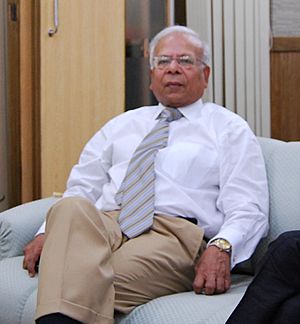Ishrat Husain facts for kids
Quick facts for kids
Ishrat Hussain
NI
|
|
|---|---|
 |
|
| Advisor to the Prime Minister for Institutional Reforms & Austerity | |
| In office 27 August 2018 – 11 April 2022 |
|
| President | Arif Alvi Mamnoon Hussain |
| Prime Minister | Imran Khan |
| 13th Governor of the State Bank of Pakistan | |
| In office 2 December 1999 – 1 December 2005 |
|
| Prime Minister | Zafarullah Khan Jamali Shaukat Aziz |
| Preceded by | Muhammad Yaqub |
| Succeeded by | Shamshad Akhtar |
| Dean of IBA Karachi | |
| In office 2008–2016 |
|
| Governor | Ishrat-ul-Ibad Khan |
| Succeeded by | Farrukh Iqbal |
| Personal details | |
| Born | 17 June 1941 Allahabad, British India |
| Nationality | Pakistan |
| Alma mater | University of Sindh Williams College Boston University |
Ishrat Husain is a well-known Pakistani civil servant. A civil servant is someone who works for the government to help run the country. He held many important jobs. He was the head of Pakistan's main bank, the State Bank of Pakistan, from 1999 to 2006. He also led a top business school, the IBA Karachi, from 2008 to 2016. Later, he advised the Prime Minister on making government better and saving money.
Contents
Early Life and Education
Ishrat Husain was born in 1941 in Agra, which was then part of British India. In 1947, his family moved from Agra to Karachi because of the partition of British India. He finished his early schooling in Karachi.
He later studied at the Government College Hyderabad. He earned degrees in zoology and chemistry. He then continued his studies in chemistry at the University of Sindh. While there, he joined student protests against a government plan called the One Unit Scheme.
Advanced Studies Abroad
Husain became very interested in development economics. This field looks at how countries can grow their economies and improve people's lives. He got a scholarship from the government to study at Williams College in the United States. In 1972, he earned his Master's degree in development economics from Williams College. He then went on to get his PhD from Boston University in 1978.
Career Highlights
After passing a special exam, Ishrat Husain joined the Civil Services Academy in Lahore. He graduated in 1964. His first jobs involved working in different parts of Sindh and in Chittagong, which was then in East Pakistan. During this time, he saw big political changes. He even worked on a committee that helped undo the One Unit policy, which he had protested as a student.
Working for the Government
After his studies at Williams College, Ishrat Husain returned to Pakistan. In 1972, he became the Deputy Secretary of the Finance Division. He quickly moved up to Additional Secretary within a year. After getting his PhD in 1978, he joined the World Bank. He wanted to be more involved in important global money discussions. His first role there was working as an economist for Liberia.
International Roles at the World Bank
By 1982, Husain left the Pakistani civil service to focus on his work at the World Bank. He had many important jobs there. He was the World Bank's representative in Nigeria. He also led the Debt and International Finance Division. Later, he became the Chief Economist for Africa. He then became the Director for Poverty and Social Policy. He also worked as the country director for countries in Central Asia. His experiences helped him understand different economic systems.
In 1994, Husain became the chief economist for the Asia-Pacific region. Between 1997 and 1999, he led the World Bank's work in Central Asia. He finished his career at the World Bank in 1999.
Leading Pakistan's Central Bank
After leaving the World Bank, Ishrat Husain was appointed the Governor of the State Bank of Pakistan. This is like being the head of the country's main bank. He held this important position from 1999 until December 2005.
Academic Leadership and Advisory Roles
In 2008, he became the Dean of the IBA Karachi. This is a very respected business school. In 2015, he received the Nishan-e-Imtiaz award from the President Mamnoon. This is one of Pakistan's highest civilian awards. He resigned as dean of IBA in 2016. However, he is still a Professor Emeritus there, which means he is a respected former professor. During his time as dean, IBA grew from just a business school into a university that teaches many different subjects. In 2016, Husain also joined the Woodrow Wilson International Center for Scholars, where he worked as a policy fellow.
Awards and Achievements

